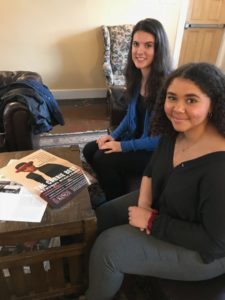The three first-year students at King’s who received Dr. Carrie Best Memorial Scholarships this year are all drawing inspiration from the human rights activist’s legacy as they settle into their studies and contemplate their futures.
“People like her [Dr. Best] inspire me to…fight for actual justice and not worry about your vulnerability in it,” says Foundation Year Program student and Carrie Best scholar Marlee Sansom, who grew up in a Toronto household where names like Carrie Best and Viola Desmond were regularly discussed.

Mairi Spencer (left) and Marlee Sansom
Marlee’s mother, Maureen Murray, was the first full-time female black journalist at the Toronto Star, and made sure her daughter had worthy role models. She told Marlee about activist, author, journalist, publisher and broadcaster Dr. Carrie Best who, in 1943, confronted racial segregation at the Roseland Theatre in New Glasgow. Dr. Best had purchased two tickets for downstairs seats to watch a movie with her son. Both of them were arrested and fought the charges to challenge segregation. Their case was unsuccessful, and they were ordered to pay damages to the Roseland’s owners. The experience motivated Dr. Best in 1946 to found The Clarion, a newspaper that exposed racism and explored the lives of Black Nova Scotians. Among her first big stories at The Clarion was writing about the case against Viola Desmond, the Halifax beautician similarly arrested, charged and fined for sitting in the whites-only seats at the Roseland Theatre.
“Carrie Best was a black female publisher in Nova Scotia when no one else [like her] was,” says Marlee. “She already knew she was a target, period, for any story she told, but she decided to tell a super-controversial story at the time to give justice to a person who needed justice.” Marlee is interested in studying law and advocating for change that would make the legal system more diverse. “It really is so important to take those risks, especially in academia,” Marlee says, to challenge not only what you learn but also point out the need for diversity and accessibility.
A renewable, $5,000/year scholarship
The Carrie Best Scholarship is a renewable King’s scholarship of $5,000/year for African-Canadian and Indigenous Students.
Mairi Spencer of Halifax says she was excited to learn she had received the scholarship, and explained its significance:
“It symbolizes to me how far my family has come for me to be in this position to just apply. For so long Red River Métis have been invisible or misunderstood. I feel very positive and happy with the recognition and open discussions that are starting to happen. People are starting to listen, learn and try,” Mairi says. “I feel this recognition brings value to those who struggled before me and led me to be where I am today.”
Mairi’s studying sciences and eyeing a career as a health professional that will enable her to make health care more accessible for all Canadians. She chose King’s, in part, because of its unique relationship with Dalhousie University. “I like being able to have both experiences. Dal is a larger school and King’s is smaller, close-knit, and there’s so much history to King’s as well. There so much to get involved with.”

Kiera Doyle
A third scholarship recipient, Foundation Year Program student Kiera Doyle, came to King’s from Margaree, Cape Breton. She describes her community there as rural and mostly white, and says receiving the Carrie Best Scholarship allowed her to connect to her Métis culture. “Every time I speak about the Carrie Best Scholarship it [indigeneity] becomes more a part of me,” Kiera says.
It’s made her more curious and in touch with her Indigenous heritage says Kiera, and made her family very proud. The scholarship has also given Kiera the freedom to focus all her time this year on her studies at King’s, a place, she says, that feels like her second home. She’s considering studying international development in her upper years.
Making the most of their time at King’s
During her long career, Dr. Carrie Best also had a CBC radio show called The Quiet Corner and a column in the Pictou Advocate, and she wrote her autobiography titled The Lonesome Road. She received an honorary doctorate from King’s in 1992, and many other accolades in her life including the Order of Canada. Dr. Best’s son and King’s alumnus Dr. James Calbert Best, BA’48, DCL’95, was co-founder of The Clarion with his mother and he later became a Canadian diplomat.
Marlee, Mairi and Kiera all say they’re honoured to have a scholarship that keeps Dr. Best’s important contributions alive in our collective consciousness today.
“People will react differently because of who you are and what race you are and what your background is, but look at the fact that [Carrie Best] is gone and we still have a scholarship and a legacy for her because her work is so important,” says Marlee. “A lot of the reason that I’m here is because of her.”
Kiera says, “I’m proud that I share a scholarship with girls like me in the name of this incredible woman.”

